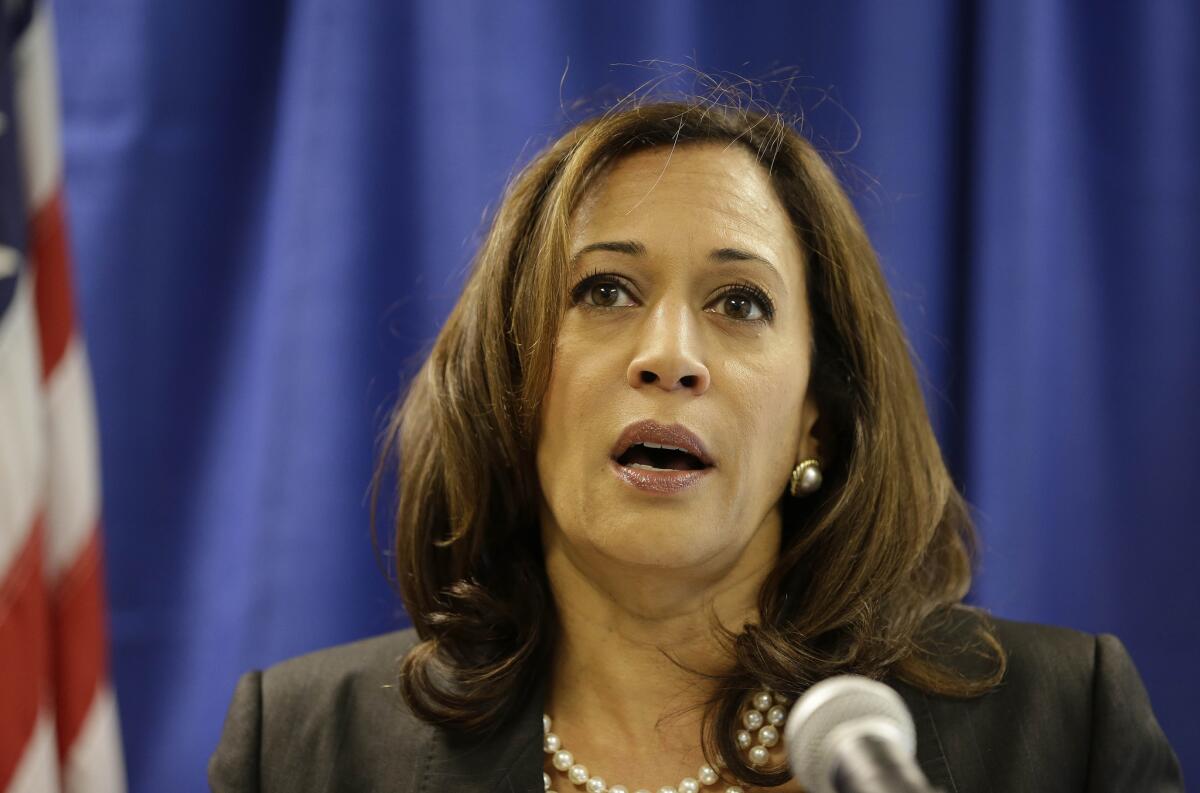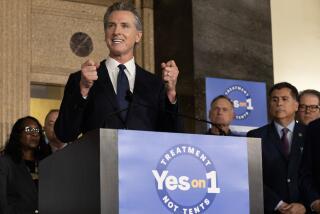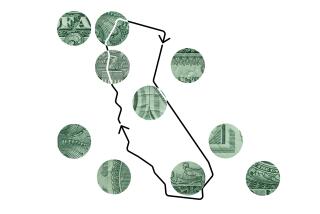California Politics 101: ‘Dark money’ doesn’t fly with voters

This post has been updated and corrected, as shown below.
As if it wasn’t bad enough to lose twice on election day, two secretive nonprofits that supported 2012’s Proposition 32 and opposed Proposition 30 each agreed Thursday to pay $500,000 in civil penalties for violating state campaign finance law. And the two California campaign committees that received the nonprofits’ help were ordered to pay an amount equal to their donations -- more than $15 million -- to the state by Nov. 30.
The lesson that the rest of the political world may derive from this episode: It’s expensive to funnel big dollars anonymously to California campaigns, and costly to take the money. But voters may already have delivered a more important message last November: They don’t respond well to “dark money.”
Proposition 30 was Gov. Jerry Brown’s initiative to increase temporarily the state’s top income tax rate and its sales tax levy to help balance the state budget without making deeper cuts to education. Proposition 32 was billed as a measure to reduce the influence of corporate and union money on elections, but its only real effect would have been to cut off unions’ main source of campaign cash. Voters approved Proposition 30 by a wide margin (55% to 45%), and rejected Proposition 32 by an even wider one (57% to 43%).
Opponents of the former and supporters of the latter were aided by numerous large donations from wealthy individuals, most notably Charles T. Munger Jr., who ponied up more than $70 million. But one donation in particular -- an $11 million payment from the Arizona-based Americans for Responsible Leadership to the Small Business Action Committee PAC of Laguna Niguel -- caught the eye of the Fair Political Practices Commission, the state’s campaign watchdog.
Under federal tax law, nonprofits such as Americans for Responsible Leadership do not have to identify their contributors. (They’re not allowed to engage in political campaigning as their primary activity either, but that’s another issue.) But California law requires campaigns to reveal who their larger donors are.
The day before last year’s general election, the FPPC announced that Americans for Responsible Leadership admitted that it was not, in fact, the real source of the $11 million. Instead, the money had come from the Virginia-based Americans for Job Security -- a pro-business group linked to libertarian billionaires the Koch brothers -- funneled through another Arizona nonprofit, the Center to Protect Patient Rights.
The reason, according to the California attorney general’s office, was that Americans for Job Security wanted to keep its name out of the disclosure forms filed by the anti-Proposition 30 and pro-Proposition 32 committees. So in the weeks leading up to the election, it gave $24.5 million to the Center to Protect Patient Rights, “which has a history of funneling millions of dollars to support conservative causes,” the attorney general’s office said in announcing the penalties Thursday.
In addition to the $11 million that went to the Small Business Action Committee, a little more than $4 million went to the California Future Fund for Free Markets. On Thursday, the FPPC sent letters to both committees demanding that they disgorge those amounts to the state by the end of next month.
All of the penalties could have been avoided had Americans for Job Security spent its money on advertisements opposing tax hikes or promoting “clean” campaigns in California more than 60 days before the election. Doing so wouldn’t have forced the committee to reveal its donors either. But it could have made the committee’s involvement, and its apparent connection to the controversial Koch brothers, more of an issue in the election.
Yet the out-of-state donations were an issue for at least some voters, particularly on Proposition 32. It was bad enough that the measure didn’t do what its backers claimed; the huge amount of “dark money” only added to the suspicion that someone was trying to pull a fast one on Californians.
At the end of the day, voters still don’t know who, exactly, was trying to persuade them to defeat Brown’s proposed tax increase and approve the restrictions on campaign fundraising by unions and public corporations. But maybe it was enough for them to know that it was a group of people who didn’t want to be identified.
[Updated, 4:55 p.m. Oct. 24: The court order signed Thursday contradicts the FPPC’s assertion in November that Americans for Job Security was the source of the $11 million donation. According to that order, by October 2012 a consultant had raised $29 million from 150 donors for Americans for Job Security for “issue advocacy” -- that is, efforts to sway public opinion without explicitly calling for people to vote for or against a specific measure. Such donations may be kept confidential. But in September, the group had concluded that any spending it did in California would be considered “express advocacy,” which would require it to disclose its donors. So it gave the like-minded Center to Protect Patient Rights a total of $24.5 million with no strings attached, although the order says the group hoped the money would be used on the Proposition 30 and 32 campaigns. “These transfers were all consistent with California law and not subject to disclosure,” the order states. The improper donations occurred when the Center gave money indirectly to the California Future Fund (through the Iowa-based American Future Fund) and the Small Business Action Committee (through Americans for Responsible Leadership), but wasn’t identified as the source of the donations.]
[For the record, 4:55 p.m. Oct. 24: The original version of this post incorrectly referred to the Center to Protect Patient Rights as Citizens to Protect Patient Rights. It also stated that Americans for Job Security could have contributed directly to the anti-Proposition 30 and pro-Proposition 32 campaigns directly without disclosing its donors. That’s not necessarily true; state law would have required the disclosure of any donor who contributed more than $1,000 knowing that the money was to be used in those campaigns.]
ALSO:
McManus: Poof goes the middle class
Leave the Nevada school shooter’s parents alone
A propofol-free colonoscopy? Some doctors say yes.
Follow Jon Healey on Twitter @jcahealey and Google+
More to Read
A cure for the common opinion
Get thought-provoking perspectives with our weekly newsletter.
You may occasionally receive promotional content from the Los Angeles Times.







